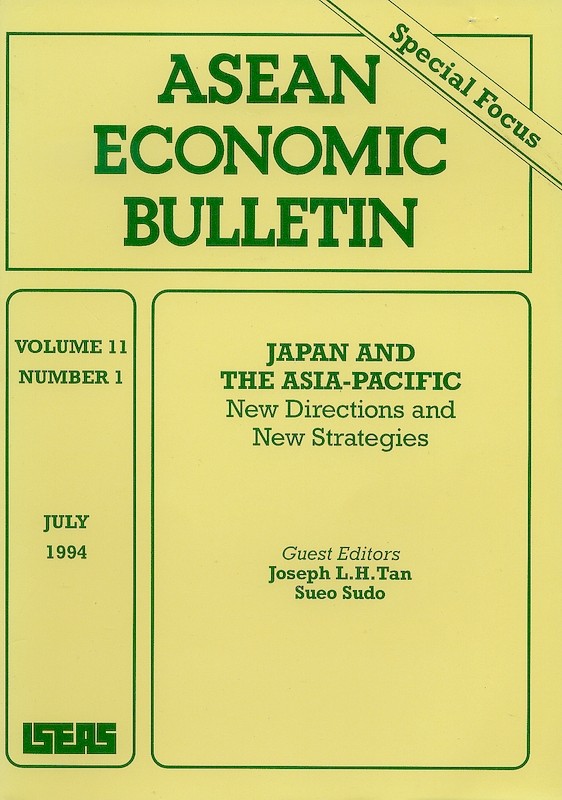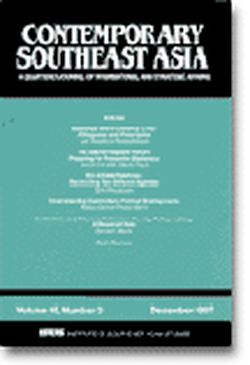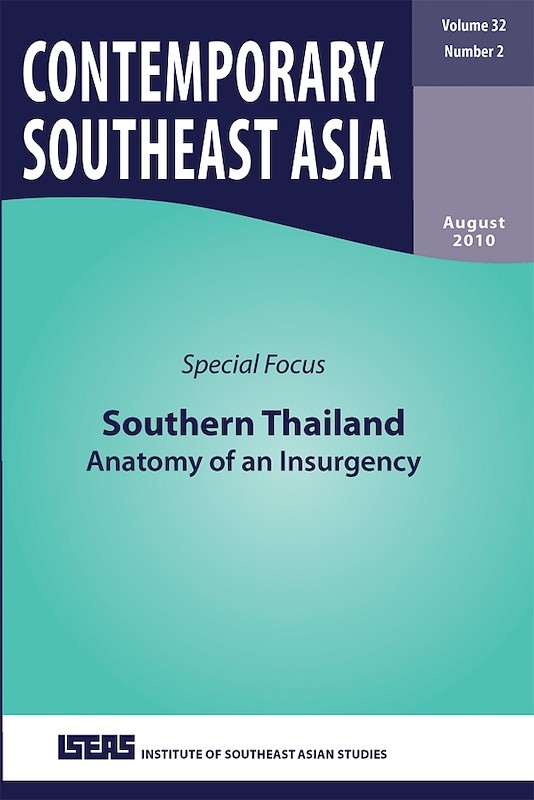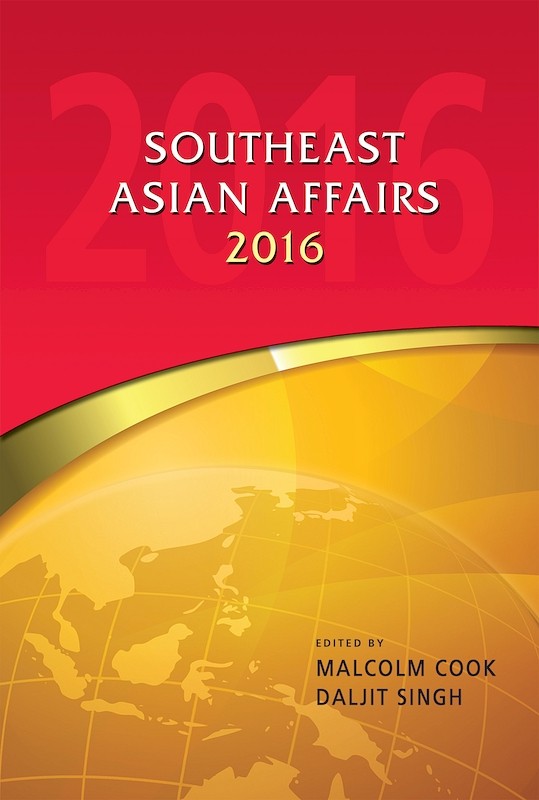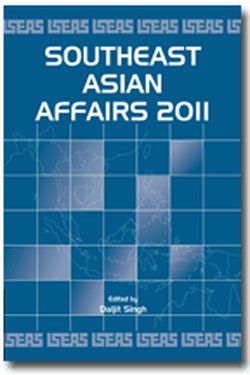Contemporary Southeast Asia: A Journal of International and Strategic Affairs Vol. 10/2 (September 1988)
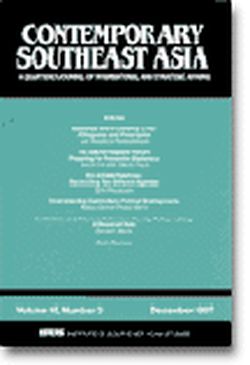
Date of publication:
September 1988
Number of pages:
101
Code:
CS10/2
Contents
-
Preliminary pages
- ARTICLES
-
From Fukuda to Takeshita: A Decade of Japan-ASEAN Relations, by Sueo Sudo, author see abstractThis paper assesses the problems and trends in Japan's relations with the ASEAN countries in the political, economic and cultural spheres. Despite the growing role of Japan in the ASEAN region, Prime Minister Nakasone's preoccupation with resolving Japan's trade friction with the West produced a ``benign neglect" of ASEAN in the mid-1980s. Politically, Japan's role in promoting a solution to the Kampuchean issue has been minimal, going little beyond the promise of aiding the post-settlement reconstruction of the Indochinese states. Cultural exchanges and diplomacy have not been sufficient in redressing anti-Japanese sentiments in the ASEAN countries caused by Japan's perceived economic domination of the region. Most importantly, the ASEAN countries have continued to express dissatisfaction over Japans inadequate response to their demands for greater market access and more generous aid and technology transfer. In recent years Japan has adopted policies intended to tackle these problems, but, according to the writer, the successful implementation of these policies will require ``substantial sacrifices" by Japan under the new government of Prime Minister Takeshita.
-
The Evolution of Philippine-Soviet Diplomatic and Trade Relations, by Thelma L Beltran, author see abstractThe opening of diplomatic ties between the Philippines and the Soviet Union caused certain apprehensions within Southeast Asia and in the United States. Initially, it was characterized as a ``sinister" move on the part of the Soviets to endanger American interests in the Philippines and to subvert peace and security in the region as well. However, this paper argues that such views ignore the compelling economic and diplomatic reasons which have prompted the Philippines to seek co-operation from the USSR. As a result of the world-wide economic recession following the oil crisis of 1973, the Philippines has had to open trade and diplomatic relations with other countries, particularly with those in the socialist and communist bloc. On the other hand, the Marcos government also sought to play the ``Soviet card" in an effort to obtain leverage in its negotiations with the United States regarding compensation for its bases. These factors should be taken into consideration in any assessment of Philippine-USSR relations.
-
The Philippine Vigilantes: Devotion and Disarray, by Justus Van Der Kroef, author see abstractIn the course of 1986-87 some 200 armed private bands, collectively called ``vigilantes", emerged in the Philippines, ostensibly organized against a rising tide of communist guerrilla insurgency. The vigilantes' appearance, encouraged by local military commanders, should be seen against the long history of Philippine ``private armies". The vigilantes' rise, along with the formal dissolution of such paramilitary groups as the Civilian Home Defence Forces (CHDF) also led to a further complication of the constitutional-legal foundation of all paramilitary organizations in the Philippines. This question became increasing urgent as many of the vigilantes engaged in serious human rights abuses that led to vociferous criticism by Philippine and foreign human rights groups and further undermined the once promising image of the Aquino government. By attempting to create a ``Civilian Volunteer Organization" (CVO) network, and also a new network of ``Citizen Armed Forces Geographical Units" (CAFGU), the Aquino regime hoped to contain the vigilante phenomenon and at the some time meet the needs of civilian participation in the national counter-insurgency programme. In this effort, Aquino was only partially successful however, as the vigilantes continued to operate with little control. The absence of operational direction and of a structured policy by the government led to splits and divisions within the vigilante groups. Such division, and often seemingly aimless drifting of some vigilantes, hastened their decline, amidst further charges of continuing human rights abuses. Though a formal ban of the vigilantes seems likely, the Aquino regime has not solved the problem Of ``citizen armies", nor the question of civilian participation in the national counter-insurgency programme.
-
Microstate Sovereignty in the South Pacific: Is Small Practical?, by Richard A Herr, author see abstractNational self-determination become a political principle for Europe from the end of World War 1 and for the rest of the world from the Atlantic Charter. While the resulting break-up of empires increased the number of small powers, the general effect of national self-determination was expected to enhance global security by ensuring that such states had strong internal authority. However, the advent of insular microstates such as Western Samoa created concern that these polities would not be able to cope with the demands of sovereignty and so could become a source of stress themselves. These fears were confirmed in 1983 with the intervention in Grenada. The South Pacific region, comprising almost entirely of insular microstates, has emerged as an arena for superpower rivalry since the Republic of Kiribati entered into a fishing agreement with the USSR in 1985. Two military coups in the pivotal state of Fiji during 1987 have added to extra-regional anxieties. Not only are the Pacific Island microstates very small powers internationally, it now appears that they may enjoy less authority domestically than once thought. The problem of microstate vulnerability has been placed on the global agenda by the events of Grenada. A variety of solutions ranging from global and regional reforms to strengthening individual states have been proposed. The experience of the South Pacific, however, suggests that these solutions may not be easily implemented. Indeed, in some cases, such as the South Pacific Nuclear Free Zone Treaty, the solution may well intensify external pressures on the region's microstates.
- BOOK REVIEWS
-
BOOK REVIEW: The National Security of Developing States: Lessons from Thailand by Muthiah Alagappa, by Chadin Tephaval, author
-
BOOK REVIEW: Rethinking Development: Essays on Development and Southeast Asia by P W Preston, by David Brown, author
- DOCUMENTATION
-
DOCUMENTATION: Meeting the Challenge of the Pacific Century by PM Gen Prem Tinsulanonda
-
DOCUMENTATION: SAP Aims to Fulfill the People's Hopes

